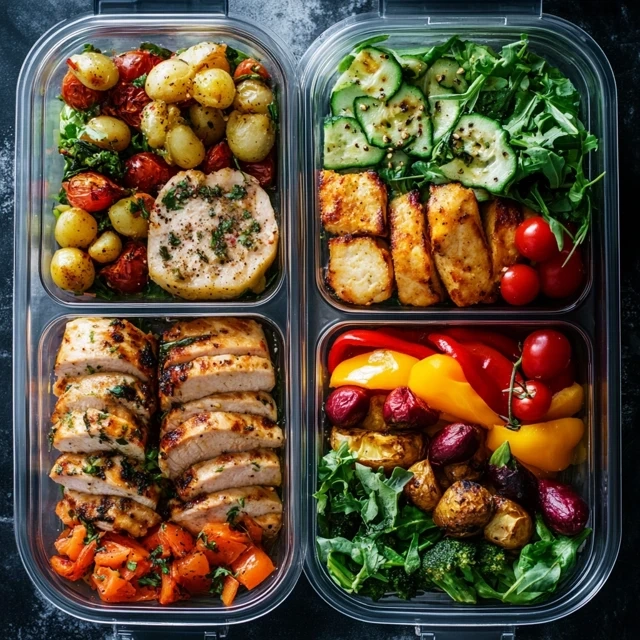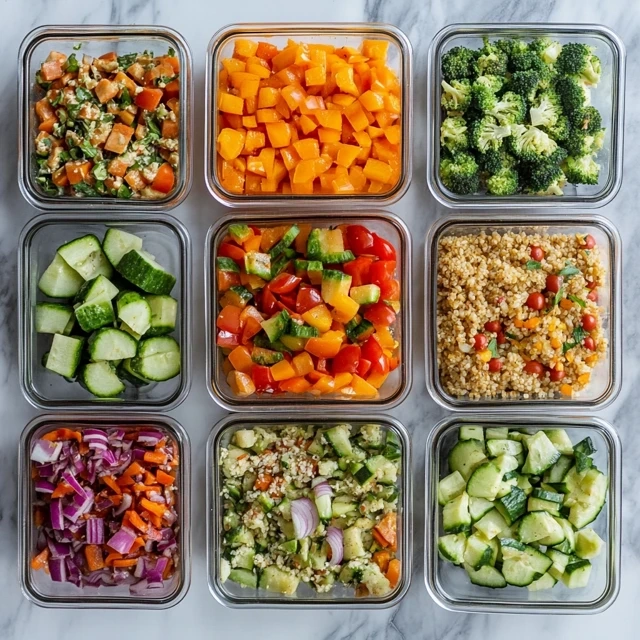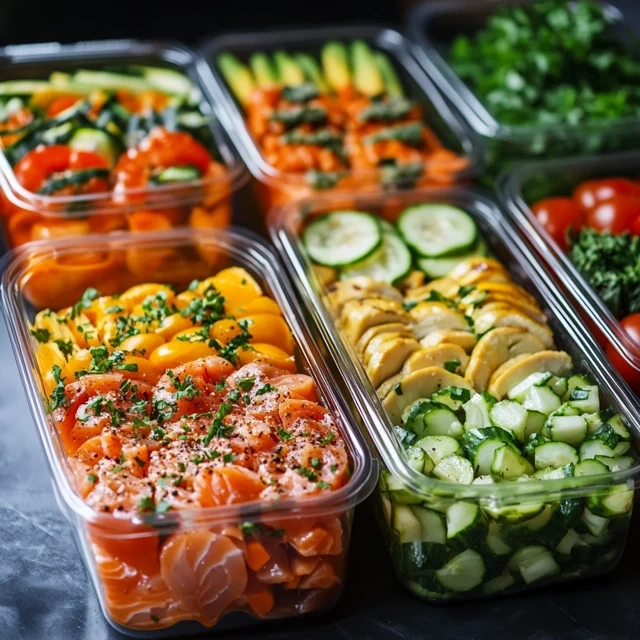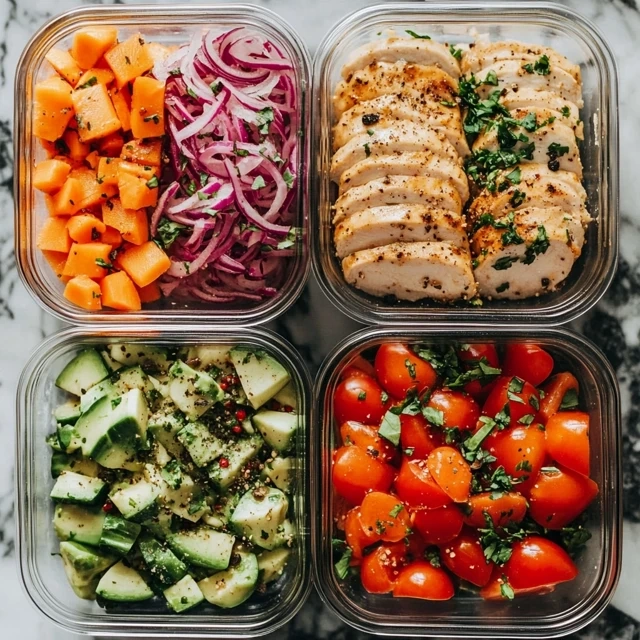Looking into an empty fridge after a long day can be tough. I’ve felt that way too tired, hungry, and tempted by takeout. That all changed when I discovered the world of Healthy Meal Prep for Beginners. It’s a simple yet powerful way to take control of your meals. Now, walking into the kitchen and finding nutritious food ready to go saves me time, money, and stress every single week.
Meal planning tips are more than just cooking ahead. They’re about taking back your time and controlling your nutrition. Whether you’re busy, a student, or just want to eat better, meal prepping can change how you see food. It’s not about being perfect, but making choices that help you stay healthy.
This guide will show you how to make simple, tasty meals that fit your life. You’ll learn about kitchen basics and smart prep techniques. You’ll see how meal prepping can be both easy and fun.
Key Takeaways
- Meal prepping saves time and reduces daily cooking stress
- Prepare nutritious meals in advance with minimal effort
- Reduce food waste and save money on eating out
- Create healthy eating habits with strategic planning
- Discover simple techniques to make meal prep enjoyable
Understanding the Basics of Meal Prepping
Starting with meal prep can change how you eat and make your week easier. It’s all about learning the basics that make healthy eating simple.
Benefits of Meal Preparation
Meal prep has many benefits for those wanting to eat better. Here are some key advantages:
- Saves time during busy weekdays
- Reduces stress around meal planning
- Helps control portion sizes
- Supports consistent nutrition goals
- Minimizes impulse food purchases
Essential Kitchen Equipment
To start with meal prep, you need some basic kitchen tools. Here are the must-haves:
- High-quality food storage containers
- Sharp chef’s knife
- Cutting boards
- Digital food scale
- Large mixing bowls
Time Management Strategies
Meal prep is about being efficient. Spend a few hours each week on prep work. Pick a day, like Sunday, to make it easier.
Begin with 2-3 meals and grow your skills. This will help you become more confident in cooking.
Healthy Meal Prep for Beginners: Getting Started

Starting your healthy meal prep journey can seem daunting. But, it doesn’t have to be. As a beginner, it’s important to begin with simple steps. Healthy meal prep is about building habits that make eating well easier.
When you start with easy meal prep recipes, keep these tips in mind:
- Start with 2-3 recipes per week
- Choose dishes with minimal ingredients
- Select recipes that can be easily scaled
- Focus on versatile protein and grain options
Your first meal prep sessions might take longer. And that’s okay. Practice makes perfect. Start with recipes that use simple cooking methods like roasting, boiling, or slow cooking. These are great for beginners and help you feel more confident in the kitchen.
Think about making a basic weekly menu with easy-to-make items. For example, you could prepare:
- Grilled chicken breasts
- Roasted vegetables
- Quinoa or brown rice
These basic ingredients can be mixed and matched to create different meals all week. Remember, healthy meal prep for beginners is about making progress, not being perfect. Start small, stay consistent, and you’ll develop a meal prep routine that fits your life.
Planning Your Weekly Menu
Effective meal planning turns your kitchen into a smooth-running machine. It saves time, reduces stress, and keeps your meals affordable. To succeed, you need to plan carefully and use smart strategies that make cooking fun and quick.
- Check your schedule for the week
- Decide how many meals you’ll make
- Look at what you already have in your kitchen
- Plan meals that fit your health goals
Creating a Shopping List
A good shopping list is your guide to efficient grocery shopping. Organize it by store sections to avoid getting lost and buying things you don’t need. Choose ingredients that can be used in many dishes to save money.
Budget-Friendly Ingredients
Save money by using affordable, versatile ingredients. Beans, rice, and seasonal veggies are great for many tasty meals. Buying in bulk and storing well can also cut costs.
Seasonal Food Selection
Choosing seasonal produce makes a big difference. It’s often cheaper, fresher, and tastes better. Look for local farmers markets or seasonal specials at grocery stores to find the best deals and add fresh flavors to your meals.
Essential Meal Prep Containers and Storage Solutions

Choosing the right containers is key for meal prep. Good storage keeps your meals fresh and organized. Quality containers protect your food and make prep easier.
When picking meal prep containers, look for these features:
- Durability
- Microwave-safe materials
- Leak-proof design
- Stackable options
- Size variety for different meal portions
Different foods need special storage. Glass containers are great for hot meals, and plastic is good for cold lunches. Stackable containers save fridge space and keep things organized.
| Container Type | Best For | Storage Duration |
| Glass Containers | Hot Meals, Reheating | 3-5 Days |
| Plastic Containers | Cold Meals, Salads | 2-4 Days |
| Bento-Style Boxes | Portioned Meals | 2-3 Days |
Invest in top-notch containers for your meal prep. Choose sets with various sizes for different meals. Always clean and dry containers well to keep food safe and fresh.
Breakfast Meal Prep Ideas
Starting your day with healthy, easy meal prep recipes can change your morning. Making breakfast doesn’t have to be hard or take a lot of time. With smart planning, you can make tasty morning meals that are quick and good for you.
For those with busy lives, quick breakfasts that last are key. Our tips for breakfast prep will make your mornings easier and your meals better.
Overnight Oats Variations
Overnight oats are a top pick for breakfast lovers. They’re easy to make ahead and can be changed up to fit your taste.
- Classic Vanilla Overnight Oats
- Chocolate Peanut Butter Blend
- Berry Almond Protein Boost
- Tropical Coconut Delight
Make-Ahead Breakfast Sandwiches
Breakfast sandwiches full of protein are great for quick mornings. Make them in big batches for a fast, filling meal.
- Egg and Cheese on Whole Wheat English Muffin
- Turkey Sausage and Spinach Breakfast Sandwich
- Vegetarian Black Bean and Egg Alternative
Protein-Packed Options
Focus on protein in your breakfast to keep your energy up and muscles strong. Nutrition basics say a balanced breakfast should have lean proteins, complex carbs, and healthy fats.
- Greek Yogurt Parfaits
- Chia Seed Protein Puddings
- Hard-Boiled Egg Meal Prep Containers
Lunch and Dinner Prep Strategies
Learning to plan meals for lunch and dinner can change your cooking routine. Portioned meals are key for those who want to eat well but don’t have much time. They save you hours in the kitchen every day.
Batch cooking is the smart way to prepare meals. Spend a few hours on the weekend to make several meals at once. You can make:
- Quinoa or brown rice as a protein-packed foundation
- Roasted vegetables for quick side dishes
- Grilled chicken or tofu for protein variety
- Homemade sauces to add flavor to portioned meals
Your meal planning should aim for flexible ingredients. Think of your prepped ingredients like building blocks. A base of quinoa, some roasted vegetables, and a protein can make many different meals.
To keep your meals interesting, change your protein sources and try new seasonings. This stops meal boredom and makes you look forward to your meals. The key to good meal planning is finding a system that fits your life and taste.
Pro tip: Get good, leak-proof containers for storing and carrying your meals. Clear containers make it easy to see what you have and help you stick to your portions.
Smart Protein Preparation Methods

Learning how to prepare proteins is key to good nutrition. It can make your meal prep easier and tastier. Mastering protein cooking saves time and keeps your meals healthy all week.
Knowing how to prepare and store proteins is vital. Each protein needs a special way to keep its taste, texture, and nutrients.
Batch Cooking Proteins
Batch cooking proteins makes meal prep faster. Here are some tips for quick protein prep:
- Grill multiple chicken breasts at once
- Roast a big batch of salmon or white fish
- Slow cook lean beef or pork for many meals
- Make tofu or tempeh in bulk for quick meals
Plant-Based Alternatives
Plant-based proteins are great for varied meals. Check out these protein-rich options:
- Quinoa: Has all essential amino acids
- Lentils: Rich in protein and fiber
- Chickpeas: Nutrient-dense and versatile
- Edamame: Full of plant-based protein
Storage Guidelines
Storing proteins right is key to keeping them fresh and safe. Here are some storage tips:
- Keep cooked proteins in airtight containers
- Refrigerate within two hours of cooking
- Eat refrigerated proteins in 3-4 days
- Freeze for longer storage
Pro tip: Label containers with prep dates to keep track of freshness and streamline your prep.
Time-Saving Preparation Techniques
Mastering your meal prep doesn’t have to take up your whole weekend. With smart strategies, you can make your kitchen work faster. A few key techniques can cut down your meal prep time a lot.
Kitchen appliances are your allies for quick meal prep. Get tools that help you out:
- Slow cookers make meals while you’re busy
- Instant Pots cook fast for many ingredients
- Food processors chop and mix quickly
Batch cooking saves a lot of time. Spend a few hours each week on big batches of proteins and grains. Chicken breasts, quinoa, and roasted veggies can mix and match for different meals all week.
Improving your knife skills and prep strategy can also save time. Learn to chop fast and group tasks. Prepping veggies ahead makes cooking easy during the week.
Your meal prep plan should fit you, not the other way around. Try different methods to find what works best for you.
Make-Ahead Healthy Snacks and Sides
Learning to prep healthy meals is key. It’s about making tasty, nutritious snacks that keep you full all day. Smart snack prep can change your eating habits and help you stay healthy without spending a lot.
Portable Snack Ideas
For budget-friendly meals, try these easy snack ideas:
- Mason jar hummus with pre-cut vegetable sticks
- Energy balls made with oats, nuts, and dried fruits
- Homemade trail mix with portion-controlled servings
- Greek yogurt parfaits with berries and granola
Vegetable Prep Tips
Prepping veggies ahead of time makes meal prep easier. Wash, chop, and store vegetables in clear containers for easy access and healthier snacking.
- Wash produce immediately after purchasing
- Use airtight containers with moisture-absorbing paper towels
- Cut vegetables into uniform sizes for consistent cooking
- Store different vegetables separately to maintain freshness
Portion Control Guidelines
Pre-portioning snacks helps avoid overeating and meets your nutrition goals. Use small containers or resealable bags for easy, portioned snacks that fit your diet.
- Use measuring cups for accurate portioning
- Invest in portion-controlled containers
- Create weekly snack packs during meal prep
- Balance macronutrients in each snack portion
Conclusion
Starting your meal prep journey can change how you see food and cooking. A beginner’s guide shows that building good habits takes time and effort. Begin with simple recipes and slowly get better.
Meal prep can save you time, reduce stress, and help you eat healthier. Remember, even pros started from scratch. The important thing is to be open and enjoy making healthy meals that fit your life.
Invest in good containers and plan your meals for the week. Don’t be scared to change your approach. With each try, you’ll get better at meal prepping. It will make cooking easier, reduce waste, and give you tasty, balanced meals all week.
With hard work and practice, your meal prep skills will grow. Stay excited, keep learning, and watch your cooking skills improve.
FAQ
What is meal prepping and why should I start?
Meal prepping means preparing meals ahead of time. It saves time, reduces stress, and promotes healthy eating. You control portions, save money, and cut down on waste. Plus, you’ll have nutritious meals ready all week.
How much time does meal prepping actually take?
Beginners can prep a week’s meals in 2-4 hours on a weekend. As you get better, you’ll prep faster and more efficiently.
What essential kitchen tools do I need to start meal prepping?
You’ll need good containers, a chef’s knife, cutting boards, and measuring cups. A slow cooker, food processor, and kitchen scale are also helpful for portioning.
How long can prepared meals be stored safely?
Most meals stay good in the fridge for 3-5 days. Cooked proteins and veggies last 3-4 days. Soups and stews can last up to 5 days in airtight containers.
Can I meal prep if I have dietary restrictions?
Yes! Meal prepping is very flexible. You can prep meals that fit your dietary needs, like gluten-free or vegan.
How do I prevent my meal prepped food from becoming boring?
Use versatile ingredients and mix cooking methods. Try different spices and sauces to keep meals exciting.
Is meal prepping expensive?
Meal prepping can save money. It reduces impulse buys, waste, and lets you buy in bulk. Focus on affordable, nutritious foods like beans, rice, and veggies.
How do I start meal prepping if I’m a complete beginner?
Start with a few meals a week. Choose simple recipes and invest in good containers. Focus on consistency and practice, not perfection.
Can I freeze meal prepped food?
Yes, many meals freeze well, like soups and proteins. Just use freezer-safe containers and label them with the date.
What are the best foods for meal prepping?
Great meal prep foods include grains, roasted veggies, baked proteins, and hard-boiled eggs. Choose ingredients that stay tasty when reheated or served cold.
